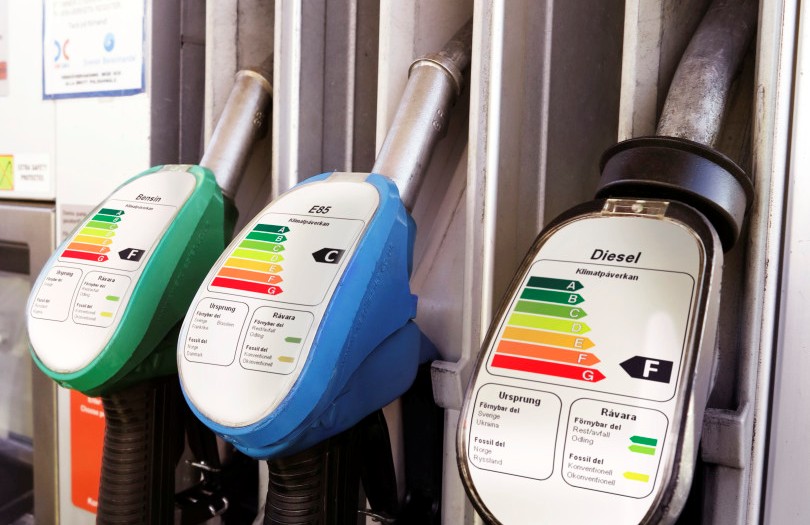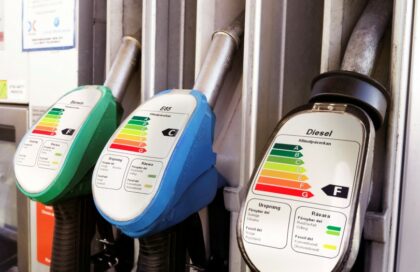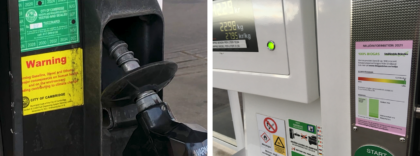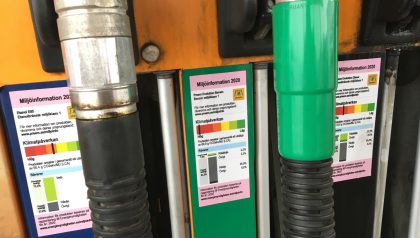How do our choices of fuels and vehicles affect climate, nature and people? Such knowledge should be given to us when we make these choices. It would release the consumer power and help steer the transport sector in a sustainable direction.
Image: Inspirational mockup by the Green Motorists showing what an eco-label on the gas pump might look like (scroll down to see how the eco-labels turned out)
We can see in the supermarket where the fish is catched and where the beef cattle is bred; we can see whether the cookies contain palm oil. We can choose between a great many products with voluntary sustainability labels such as KRAV and Fairtrade.
There is not nearly as much sustainability-related consumer information available in the transport sector. This is so even though it is particularly important here. The transport sector gives rise to one third of the greenhouse gas emissions in Sweden. Everybody travels; every one of us contributes to these emissions. If we are given the chance to make informed choices these emissions can therefore be substantially reduced.
But there is more to sustainability than greenhouse gas emissions. The changeover to fossil free transport releases huge market forces in the search for new natural resources. Freely available information is necessary to steer these forces in a sustainable direction. Otherwise we may devastate of the last rain forests in order to cultivate oil palms for biodiesel, or exploit children as labour force when raw materials for electric car batteries are mined.
Widened campaign
Using the watchword I Want to Know (Jag Vill Veta) the Green Motorists campaigned for five and a half years for eco-labels on fuel dispensers, showing the climate intensity and origin of the fuel we were about to pour into our car. When the Swedish government decided to introduce such eco-lables in August 2018 we decided to widen our perspective.
Now we also call for better traceability of fossil fuels, and eco-labels on new cars in Sweden that resemble those found on our fuel pumps. Another possibility is to show comparisons between the climate impact of different choices of modes of transport when you buy tickets or make reservations.
The climate crisis is global, and so is the fuel and car industry. If consumer power is to have the slightest impact on the global scale we need international rules. The Swedish Association of Green Motorists is therefore seeking international cooperation for work along these lines.
The introduction of mandatory eco-labels on fuel dispensers all across Sweden was celebrated October 4th 2021 with a webinar. Similar initiatives in the U.S. and Great Britain were also discussed with international guests, and ways to make the idea spread.
Arnold Schwarzenegger has promoted climate chang warnings on gas pumps, and celebrates the introduction of the Swedish eco-labels.
Topics
The case for sustainability labels on fuel dispensers
In this essay, we argue that eco-labels on fuel dispensers are needed, as well as climate change and health warning labels. We also present evidence that they are potentially effective and will be well received. Social psychologist Stylianos Syropoulos has contributed to this part of the text. Read more.
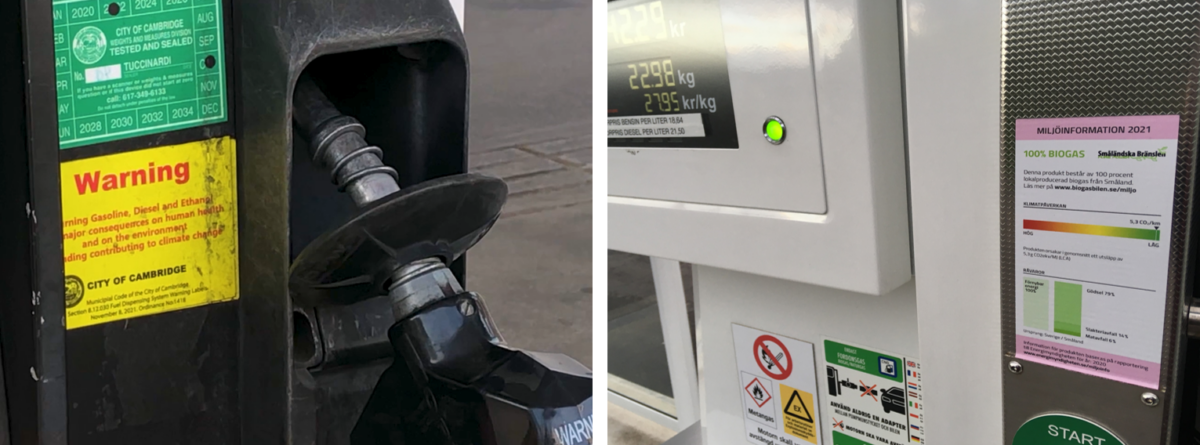
Eco-labels on new cars in Sweden and at refuelling stations across Europe?
Up until now, the automobile and fuel industries have largely been able to hide their tracks when it comes to the origin and carbon footprint of their products. But times they are a-changin’. We put the spotlight on recent pushes for transparency. Read more.

Swedish fuel dispensers now get mandatory eco-labels
From October 1, 2021, the climate intensity, renewable share, and origin of all kinds of transportation fuels must be disclosed on dispensers in Sweden. This is the world’s first mandatory eco-labels of this kind. Read more.
See also article in The Guardian, and the first evaluation of the labels a few months after their introduction.
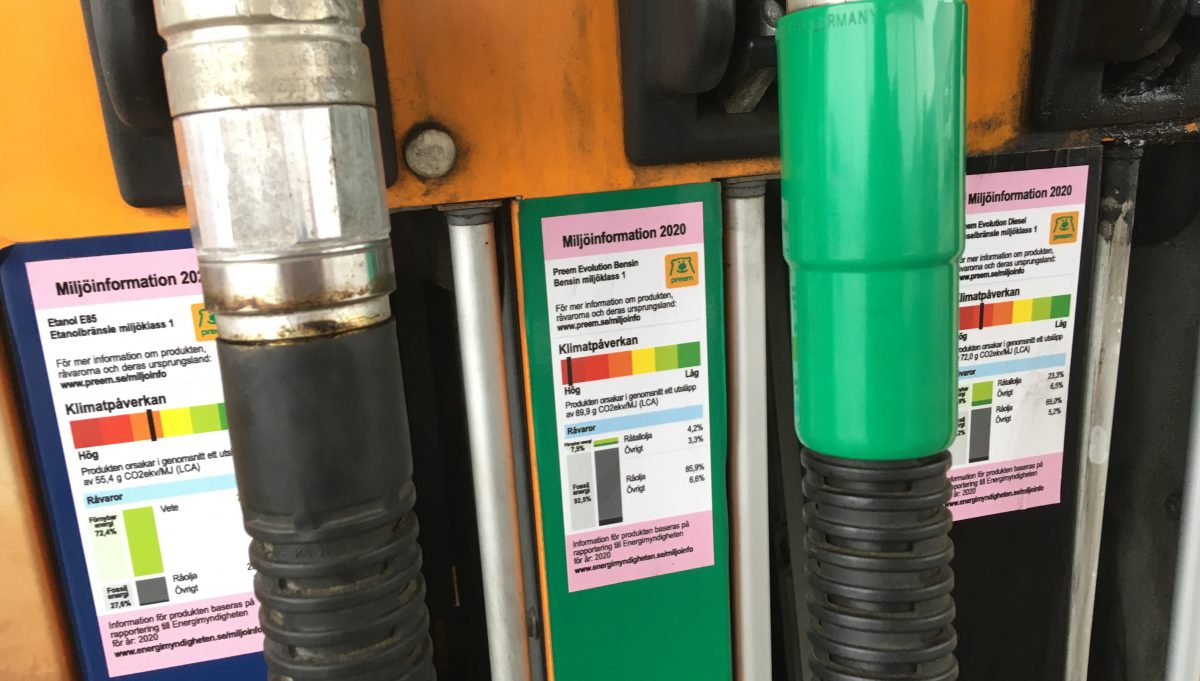
Kraftringen and E.ON – The world’s first companies to put eco-labels on their fuel dispensers
In July 2020 Kraftringen put eco-labels on their charging stations and biomethane dispensers. In october 2020, E.ON followed.
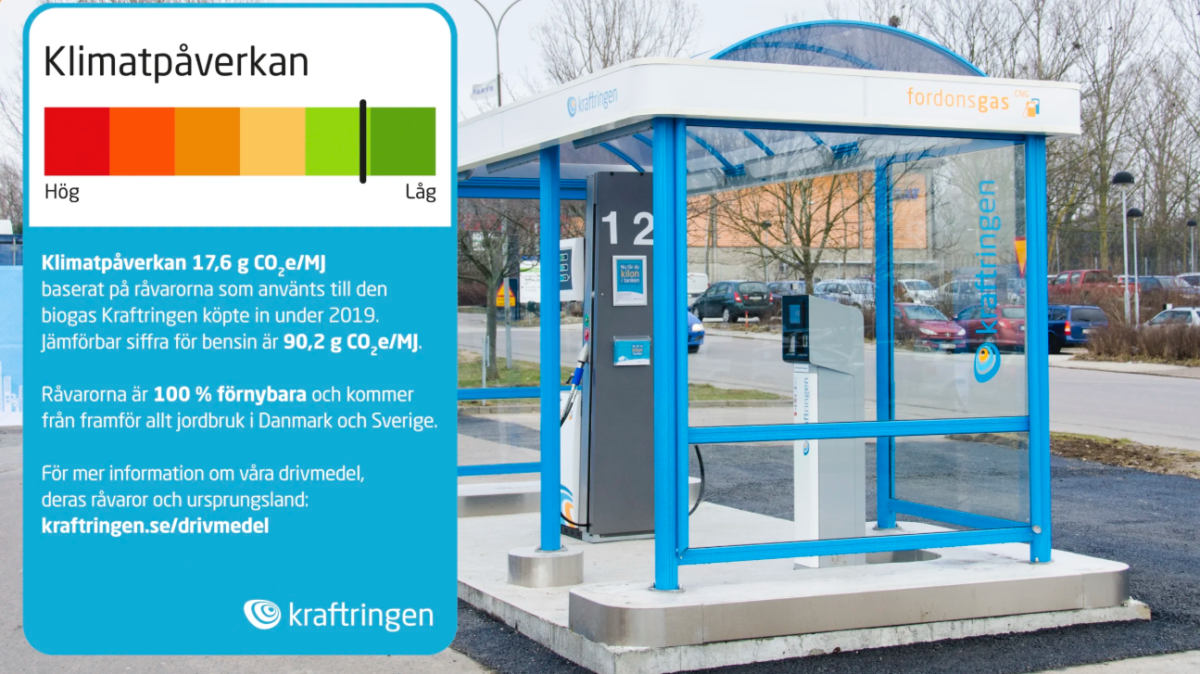
The winding road to eco-labels on Swedish gas pumps
Read the history of the eco-labels on Swedish fuel diespensers from the perspective of the Green Motorists, together with some reflections and lessons.
Read also a press release by the Green Motorists from August 2018 that details the regulation.
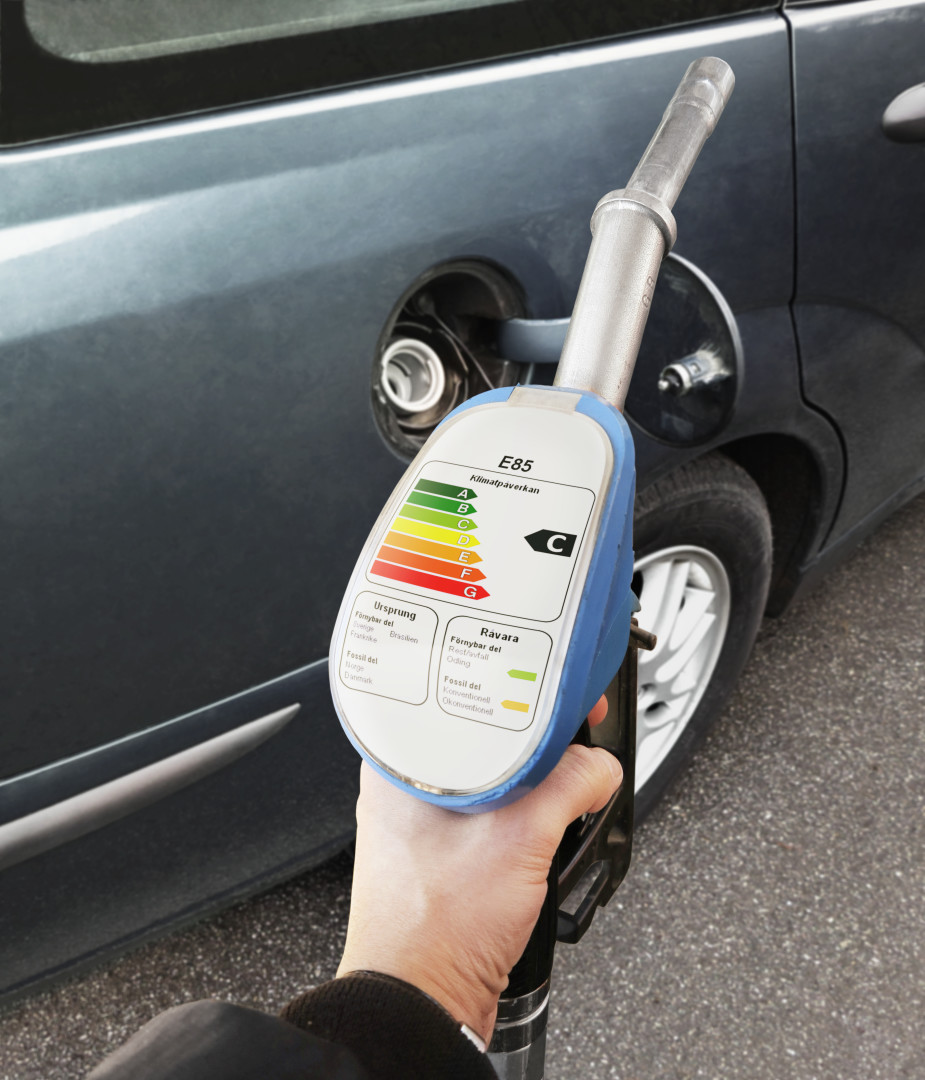
Impact of eco-labels on gas pumps
What are the potential benefits and drawbacks of the Swedish eco-labels? Will they affect the fuel market? Opinion polls and evaluation of similar energy labels provide clues. Read more.
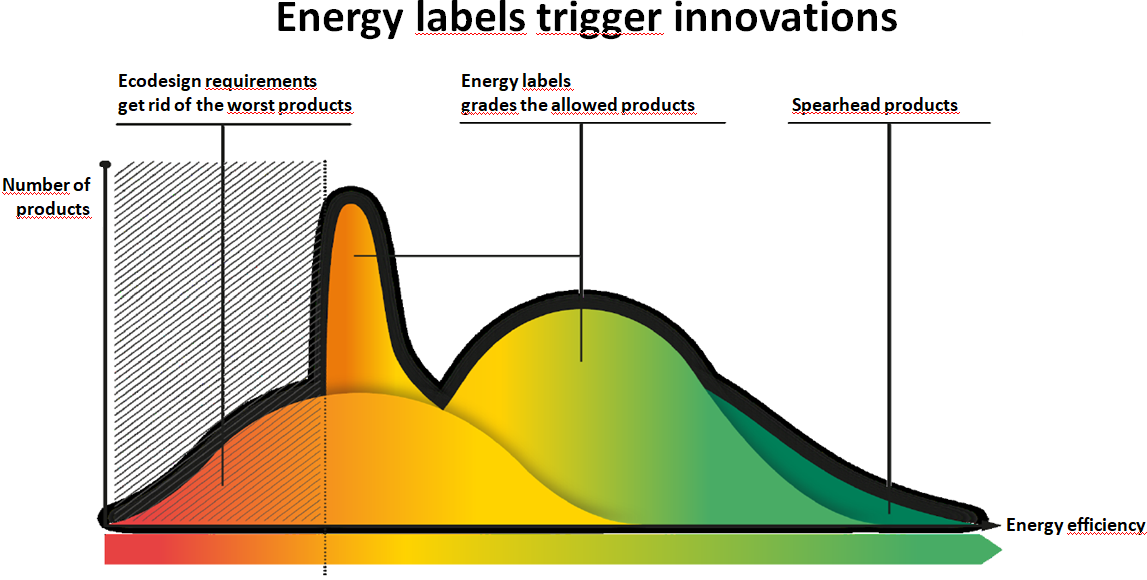
Collaboration
The market for fuel, cars and long range travel is international. To have any real impact, eco-labels and warning labels have to be introduced in many countries, just like health information and warnings on cigarette packages. Green Mobilists Sweden therefore talk to and collaborates with a number of international organizations, activists, academics and politicians. We may mention Think Beyond the Pump, Our Horizon, The Schwarzenegger Institute, Ditchley Foundation and Transport & Environment.
In January 2020 the City Council in Cambridge, Massachusetts, decided to put climate and health warning stickers on all gas pumps in the city. They were introduced within a year.
In January 2023, bills were introduced in the state of Hawaii Senate and House requiring climate and health waring labels on all gas pumps. The Senate passed the bill in March 2023. However, the House Comittee on Energy & and Environmental Protection Committee subsequently recommended that the bill be deferred. This was so despite an impressive array of testimony in support of the bill from international experts in climate, health and communication. Hopefully, the Hawaii Legislature soon gets its act together.
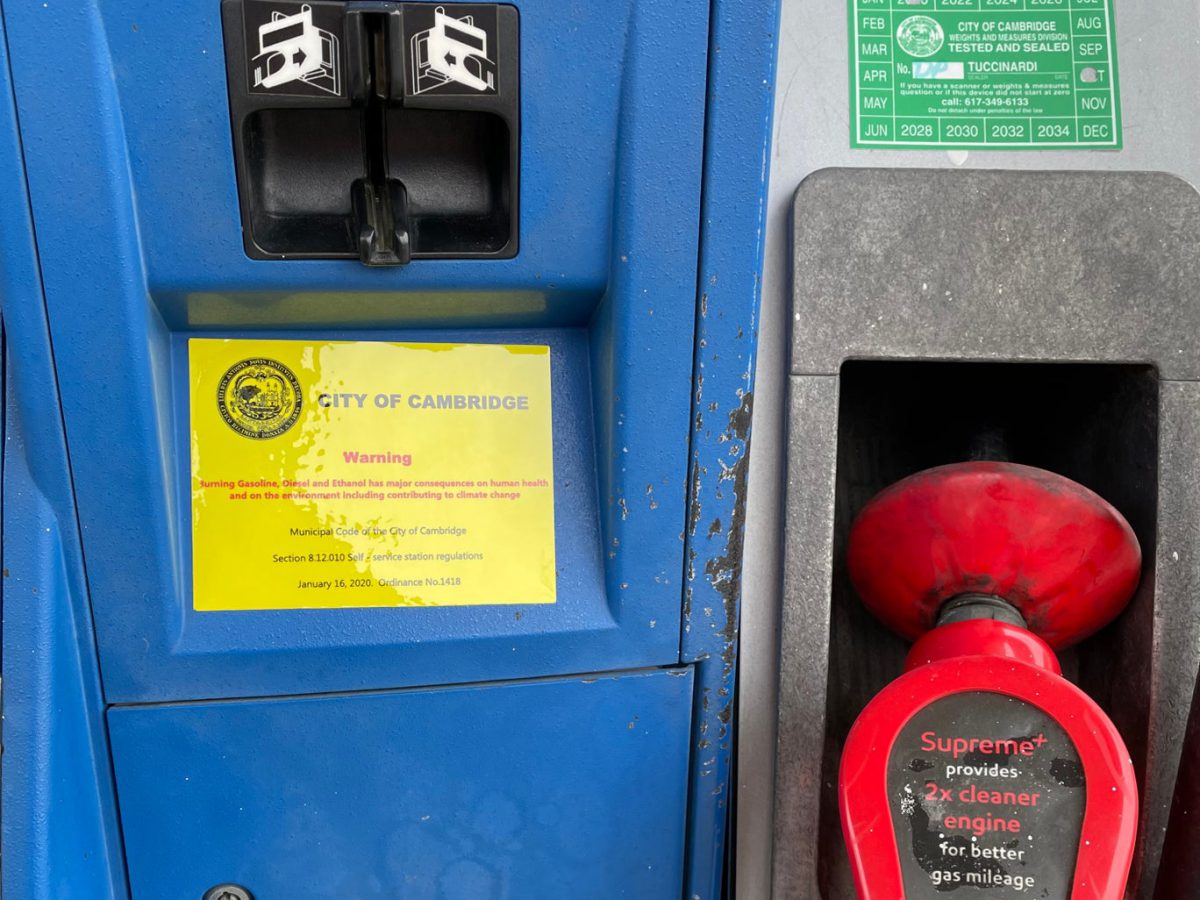
Cigarettes and cars – same same, but different
It is dangerous to burn tobacco and fossil fuels. But cars are useful, while cigarettes are not. Another difference: there is health information and warning labels on cigarettes packages, but nothing of the sort on fuel pumps – up until now. Sweden is the first country in the world with environmental information on the pump. Cambridge, Massachusetts, is the first place in the world with warning labels. Read more.
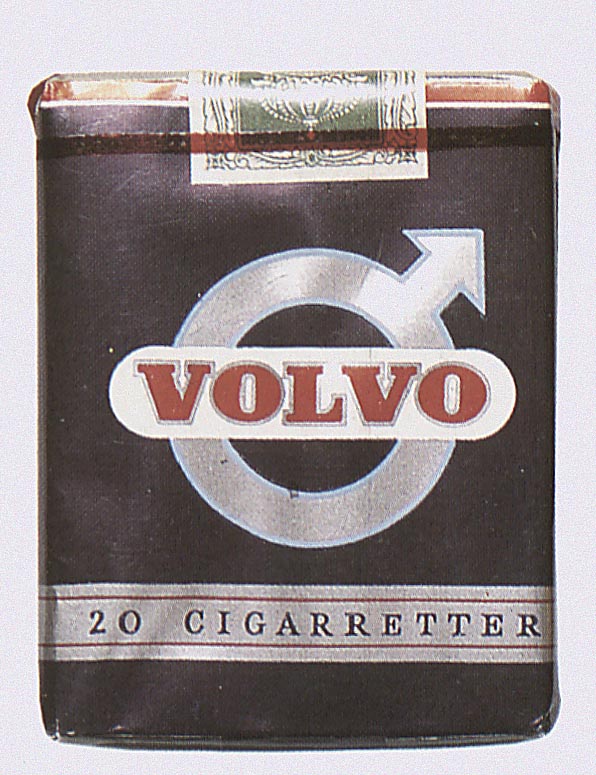
Roundtable in Vienna
During the R20 Austrian World Summit in Vienna May 28-29th 2019 Karolina Skog, who passed the bill on eco-labels on Swedish fuel pumps, and the Green Motorists had the opportunity to talk to Arnold Schwarzenegger and a delegation from California. Read more.

Release the consumer power in the fight for sustainable mobility
Read a debate article by the Green Motorists published in the political magazine Altinget on March 4th 2019.
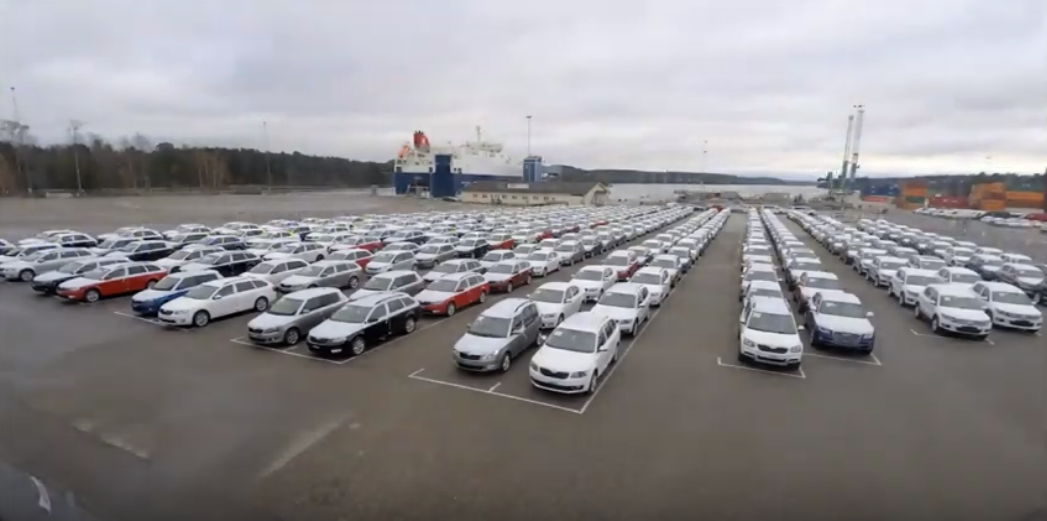
About time to put eco-labels on new cars in Sweden
Read a press release by the Green Motorists from April 5th 2019.

Time to find the source of oil
Read an op-ed by the Green Motorists published in the Swedish daily Svenska Dagbladet on November 12th 2018.

Inspiration
Together with the campaign by Think Beyond the Pump and Our Horizon to bring warning labels to gas pumps in Cambridge, MA, the campaign for eco-labels on Swedish fuel pumps is highlighted as an inspiration at cool4climate.org, which is run by Oxford Climate Policy and the Environmental Change Institute.
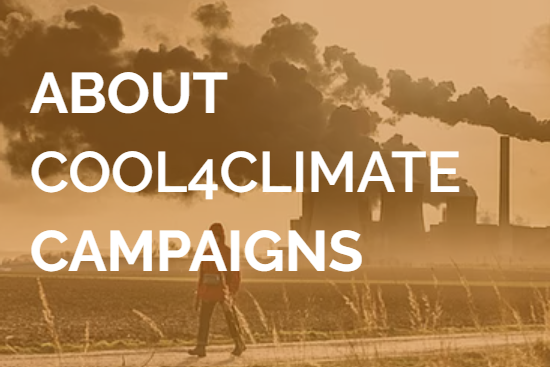
Is responsibility personal or political?
Is the responsibility for the changeover to sustainable mobility personal or political? The Green Motorists consider the question to be ill-posed. It is an expression of the either-or thinking that is all too common in the debate.
Should we rely on consumer power or radical political decisions? Should we combat climate change at home or abroad? Should we stop driving cars or make them less harmful to the environment? Are more energy efficient cars or renewable fuels the thing to go for? Electricity or biofuels? Ethanol or biodiesel? Of course all actions and all technical solutions that can contribute to sustainable mobility must be welcomed.
At best different actions and solutions cross-fertilize each other. Strengthened consumer power via eco-labels on fuel pumps will help educate and sensitize the citizens. This pushes the politicians forward and facilitates radical decisions, such as eventually putting an end to the sale of fossil fuels. Thus we cannot speak of personal responsibility as opposed to political responsibility. The one facilitates the other.
Media in English
China Development Gateway 20/8 2016: Sweden to introduce eco-labeling for car fuels: minister
ENDS Europe 20/3 2018: Swedish fuel pumps to get eco-labels
Bloomberg Environment 17/8 2018: Sweden’s gas pumps must soon include climate impact labels
Mobility Lab 10/10 2018: We put warning labels on cigarettes. Why not on gas pumps?
Future fuel strategies 11/10 2018: Climate warning labels on fuel pumps: A taste of the future?
The Daily Californian 12/2 2019: California needs to add eco-labels to gas pumps
San Francisco Chronicle 18/2 2019: Warming labels needed at the gas pump
International Labtag 21/3 2019: Promoting climate change awareness with labels
Huffington Post Canada 29/8 2019: Doug Ford’s Right. Show Ontarians The Full Price They’re Paying At The Pumps.
Mobility Lab 27/9 2019: How environmental warning labels at gas pumps could change our transportation culture
The Environmental Magazine 3/3 2020: Pumping gas: Hazardous to your health and the planet
Huffington Post 19/3 2020: Should gasoline come with a climate change warning label? These cities think so.
BMJ (British Medical Journal) 31/3 2020: We need health warning labels on points of sale of fossil fuels
The Sunday Times 31/3 2020: Plea for cigarette-style warnings on fuel pumps
The Guardian 31/3 2020: Climate-damaging products should come with smoking-style warnings
Popular Mechanics 5/4 2020: Climate Experts Want Fossil Fuel Warning Labels At the Pump
Automotor Hungary 6/4 2020: Svédországban energiacímkét kapnak a töltőpisztolyok (Swedish fuel pumps get energy labels)
Stuff (New Zealand) 24/4 2020: Could eco-warning labels on petrol pumps cut emissions?
Extinction Rebellion 28/8 2020: This is an health emergency! Doctors spark mass flyposting of petrol pumps with graphic health warnings across UK
The Independent 28/8 2020: Extinction Rebellion: Tens of thousands of warning labels stuck on petrol pumps across UK as part of new campaign
NBC Boston 19/11 2020: Cambridge to place carbon emission warning labels on gas pumps
The Earthbound Report 4/12 2020: It’s time for full transparency about petrol
Grist 18/12 2020: Guilt at the gas pump? That’s (part of) the idea
The Guardian 25/12 2020: Massachusetts city to post climate change warning stickers at gas stations
CleanTechnica 25/12 2020: Cambridge To Post Warning Stickers On Gas Pumps
Woxx (Luxemburg) 26/12 2020: Klimawarnung an Zapfsäulen
7News WHDH Boston 30/12 2020: Cambridge becomes first city in America to put climate warning labels on gas pumps
Forbes 31/12 2020: We Need To Start Being More Aware Of The Harm We Do When We Fill Our Tanks
The Independent 31/12 2021: Cambridge, MA is first place in US to have climate warning labels at gas pumps
James R. Brooks, Kristie L. Ebi, Global Challenges, published online 21/7 2021: Climate Change Warning Labels on Gas Pumps: The Role of Public Opinion Formation in Climate Change Mitigation Policies
Treehugger 22/7 2021: Gas Pump ’Warming Labels’ Could Galvanize Support for Decarbonization Policies
The Guardian 1/10 2021: Swedish fuel retailers required to display eco-labels at pumps
Cedrec – Legislation made simple 4/10 2021: Eco-labels on fuel pumps in Sweden
Curation. 8/10 2021: Sweden begins using eco-labels for transport fuels
Bloomberg 19/7 2022: Where Are All the Climate Warning Labels on Gas Pumps?
Capetalk 13/9 2022: We need warning labels at the points of sale of fossil fuels, argues a health expert
Hawai’i Free Press 30/1 2021: Hawaii may become the first U.S. state with climate change warnings on all gas pumps
Honolulu Star-Advertiser 19/1 2023: Climate warning labels sought for self-service gas stations (Free version at Yahoo)
The BMJ (British Medical Journal) 10/3 2023: Sixty seconds … on petrol pumps
Sharon Yadin, Cambridge University Press, published online 13/7 2023, Fighting climate change through shaming
TIME 1/11 2023: What Happens When Diners Are Shown Climate Warning Labels on Meat Dishes
Honolulu Civil Beat 16/2 2024: Health-Climate Warning Labels Needed On Hawaii Gas Pumps
